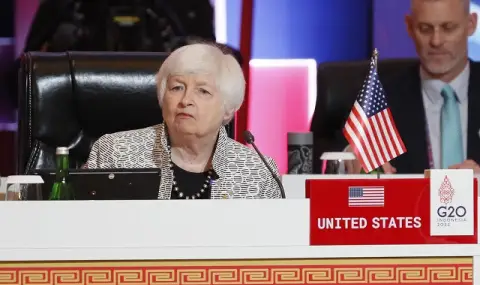US Treasury Secretary Janet Yellen returned to the US from a four-day visit to China, and the results of her meetings today are a major topic in the US press.
Yellen visited China for the second time in the past nine months in an attempt to stabilize relations between Washington and Beijing, which have been strained for years, he wrote in today's edition of the "Washington Post". US Secretary of State Anthony Blinken is also expected to visit China later this year. US President Joe Biden and his Chinese counterpart Xi Jinping spoke by phone last week, and the two superpowers made some progress in repairing their relationship, which has been marred by lingering trade and technology disputes.
China has largely welcomed Yellen, who is seen in Beijing as a pragmatist opposed to "disengagement" between the world's two largest economies. Chinese state media have raved about her skill with chopsticks during her visits to restaurants serving local Chinese cuisine, the Washington Post also wrote.
But the positive tone was undermined by growing concerns in Europe and the US that a wave of cheap Chinese exports – mostly "green" technology, but also electronic devices and steel, could push international competitors out of business, notes the American newspaper.
Analysts warn of a repeat of the "China shock" that hit the US economy 20 years ago if Beijing continues to pour money into manufacturing to boost China's slowing economy.
"China is simply too big now for the rest of the world to absorb this huge capacity," Yellen said. "When the world market is flooded with Chinese goods at artificially low prices, the viability of American and other international companies is called into question," said the US Treasury Secretary. Yellen added that US concerns were not "stemmed from anti-China sentiment" and that they are shared by many other countries around the world, including Japan, Mexico, the Philippines, as well as throughout Europe.
Beijing appears to recognize the need to make efforts to contain growing trade tensions caused by Chinese overproduction, commented the "Washington Post".
After meeting with Chinese Vice Premier He Lifeng, Yellen announced the start of an "intensive exchange" to overcome global economic "imbalances". Negotiations will begin within a few weeks.
The US Treasury Secretary declined to comment on the measures that Washington will insist Beijing take, but indicated that Chinese authorities should stimulate domestic consumption to balance the current over-reliance on manufacturing, notes the Washington Post. ;.
The most pressing issue likely to divide Washington and Beijing in the coming months is how the Biden administration intends to respond to concerns that Chinese exports of electric cars, lithium-ion batteries and solar panels threaten sectors whose development in The US spends trillions of dollars, writes in. "New York Times".
China denies illegally subsidizing its exports of new energy sources and expresses concern about what Chinese authorities see as a wave of unfair protectionism, the US newspaper noted. On Sunday, Yellen met with Chinese Premier Li Qiang in Beijing, with whom she also discussed the issue of Chinese exports. Li indicated that the subject should be viewed objectively and from a "market point of view", highlighting the position that the jump in exports is due to global demand, the "New York Times" also writes.
"China hopes that the US side will work with the Chinese side to adhere to the basic norms of market economy, fair competition and open cooperation, and refrain from politicizing and tying national security to economic and trade issues," Li was quoted as saying in the Chinese government's official press release after the meeting.
As it seems, Yellen's visit led to an agreement to continue negotiations on the issue of industrial overcapacity and Chinese trade practices, commented the magazine "Foreign Policies". "Yellen can place the pledge in question alongside one made during Barack Obama's administration, when the White House turned its attention to harmful Chinese economic practices that endangered American workers at the time and received assurances from Beijing that things would soon change." ;, the American magazine also writes.
Yellen is now, as she was a decade ago, focused on real issues – solar panels, electric cars and the batteries that power them. These are many of the things the Biden administration wants the US to produce. In this direction, major initiatives are being taken, such as the Inflation Reduction Act of 2022, which includes state incentives for the domestic production of green energy, recalls "Foreign Policies".
However, the publication points out that China's clean energy production is on a completely different scale. "Take solar panels for example. The US can produce about 11 gigawatts of panels per year, and thanks to the efforts of the Biden administration, they hope to triple that figure in the coming years. A single Chinese company – "Ginkgo Solar" (Jinko Solar), just broke ground on a 56 gigawatt plant. According to data from the International Energy Agency, the country as a whole can produce more than 400 gigawatts of new panels per year, which represents more than 80% of the world's production capacity for each stage of production.
"As huge as the Chinese market is for these same solar panels – and it's the biggest market in the world, it's not that big. China produces twice as many solar panels as it can use at home. The results are predictable: the surplus goes to exports worth more than 30 billion dollars a year," the publication estimates.
"The Chinese leadership seems to have no other recipe for growth than the export-based model. China's economic mantra is to deploy "new productive forces", although it should actually deploy domestic economic consumption, not put a thumb on the scales to turn its megafactories into gigafactories," the American magazine also commented.
"Yellen and her Chinese interlocutors agreed to disagree and continue to negotiate,", concludes "Foreign Policy".
